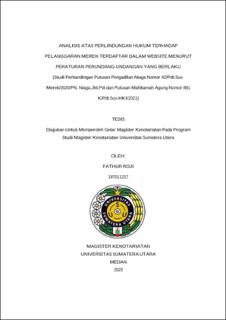Analisis Atas Perlindungan Hukum terhadap Pelanggaran Merek Terdaftar dalam Website Menurut Peraturan Perundang-Undangan yang Berlaku (Studi Perbandingan Putusan Pengadilan Niaga Nomor 42/Pdt.Sus-Merek/2020/PN. Niaga.Jkt.Pst dan Putusan Mahkamah Agung Nomor 881 K/Pdt.Sus-HKI/2021)
Analysis of Legal Protection Against Infringement of Registered Trademarks on Websites According to Applicable Laws and Regulations (Comparative Study of Commercial Court Decision Number 42/Pdt.Sus- Merek/2020/PN. Niaga.Jkt.Pst and Supreme Court Decision Number 881 K/Pdt.Sus-HKI/2021)

Date
2023Author
Roji, Fathur
Advisor(s)
Saidin
Siregar, Mahmul
Leviza, Jelly
Metadata
Show full item recordAbstract
The rise of trade transactions via the internet, known as e-commerce, has led to new issues, including the trade of counterfeit branded goods, which are produced at a lower cost by leveraging the name and reputation of well-known brands. The problems addressed in this study are: (1) how legal protection aspects for registered trademarks handle trademark infringements on websites according to existing regulations, (2) what are the legal considerations of the Commercial Court judges in the case concerning the Timberlake trademark, which bears substantial similarity to Timberland, in Decision No. 42/Pdt.Sus. Merek/2020/PN.Niaga Jkt Pst, and (3) what are the legal considerations of the Supreme Court judges in their ruling granting the lawsuit regarding Timberlake, which shares substantial similarity with Timberland, in Supreme Court Decision No. 881 K/Pdt. Sus-HK1/2021, compared to the Commercial Court's Decision No. 42/Pdt. Sus. Merek/2020/PN.Niaga Jkt Pst. This research employs a normative juridical approach using case study analysis. The qualitative method was applied to process and analyze the data, and conclusions were drawn deductively through normative frameworks. The findings indicate: the legal protection to address trademark infringement on websites is not explicitly and directly stated in Indonesian regulations but is inferred from various related articles in laws such as Law No. 20 of 2016 on Trademarks and Geographical Indications, Law No. 11 of 2008 on Electronic Information and Transactions, Law No. 8 of 1999 on Consumer Protection, and Government Regulation No. 80 of 2019 on Electronic Commerce. The Commercial Court judges legal consideration in Decision No. 42/Pdr Sus. Merek/2020/PN.Niaga Jkt Pst was appropriate, recognizing Timberland as a well-known brand with a strong reputation and general public recognition. The Supreme Court's legal consideration in Decision No. 794 K/Pdi Sus-HKI/2020 compared to Decision No. 42/Pdt.Sus. Merek/2020/PN.Niaga.Jkt. Pst was also correct and appropriate as it demonstrated the principle of legal certainty, ensuring the law functions properly and justice is achieved. Recommendations include: a need for regulations that provide detailed legal protection and certainty for registered trademarks in addressing trademark infringements on e-commerce platforms. The plaintiff's legal counsel should advise the inclusion of claims regarding bad faith. Moreover, Supreme Court Decision No. 881 K/Pdt. Sus-HKI/2020 should be adhered to by all parties and serve as a reference in similar future cases.
Collections
- Master Theses (Notary) [2307]
